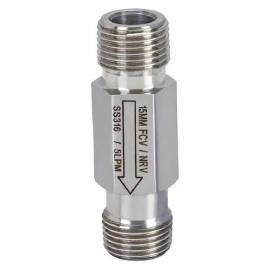Flow control valves are essential components in fluid handling systems, designed to regulate the flow rate of liquids and gases. These valves are widely used in a variety of industries, including manufacturing, chemical processing, water treatment, and HVAC systems. By adjusting the flow of fluid through a system, flow control valves ensure optimal performance, efficiency, and safety of the system. These valves are integral in maintaining pressure, reducing energy consumption, and ensuring that systems function smoothly and reliably.
- Home
- Products
- Flow control valves
Flow control valves

Key Features of Flow Control Valves:
- Precise Flow Regulation: Flow control valves are designed to offer precise control over the flow rate, allowing for accurate adjustments to meet specific operational requirements.
- Pressure Control: Many flow control valves are equipped with pressure regulation features, helping to maintain consistent pressure within a system and prevent overpressure situations.
- Durability and Longevity: Constructed from high-quality materials like stainless steel, brass, or plastic, flow control valves are built to withstand wear and tear, offering extended service life even in demanding environments.
- Versatility: Flow control valves can be used in a wide range of applications, including high-temperature systems, low-pressure environments, and corrosive fluids.
- Simple Operation: These valves can be manually or automatically operated, depending on the application, and provide smooth, reliable performance with minimal maintenance.
- Corrosion Resistance: For applications involving corrosive liquids or gases, flow control valves can be made with materials that resist corrosion, such as coated or stainless steel bodies.
- Energy Efficiency: By maintaining the appropriate flow and pressure, these valves can help reduce energy consumption, leading to cost savings in the long term.
Types of Flow Control Valves:
- Needle Valves: Used for precise flow control in low-flow applications, needle valves provide fine adjustments with a threaded stem.
- Ball Valves: These valves use a rotating ball to control the flow of liquid or gas, offering quick shut-off and excellent sealing capabilities.
- Globe Valves: Globe valves are designed to control flow by regulating the position of an internal disk or plug, suitable for applications requiring fine flow regulation.
- Diaphragm Valves: These valves use a flexible diaphragm to regulate flow, offering excellent control and sealing, particularly in hygienic or sanitary systems.
- Pressure Regulating Valves: These valves maintain consistent system pressure by adjusting the flow of fluid into the system, ensuring optimal operation.
Advantages of Using Flow Control Valves:
- Precise Control: Enables fine adjustments to fluid flow for various applications.
- Safety: Helps prevent overpressure and ensures the system operates within safe parameters.
- Durability: Built to last, even under harsh working conditions.
- Energy Savings: Optimizes flow to reduce energy costs in fluid handling systems.
- Effective: Minimizes system inefficiencies, leading to reduced operational costs.
